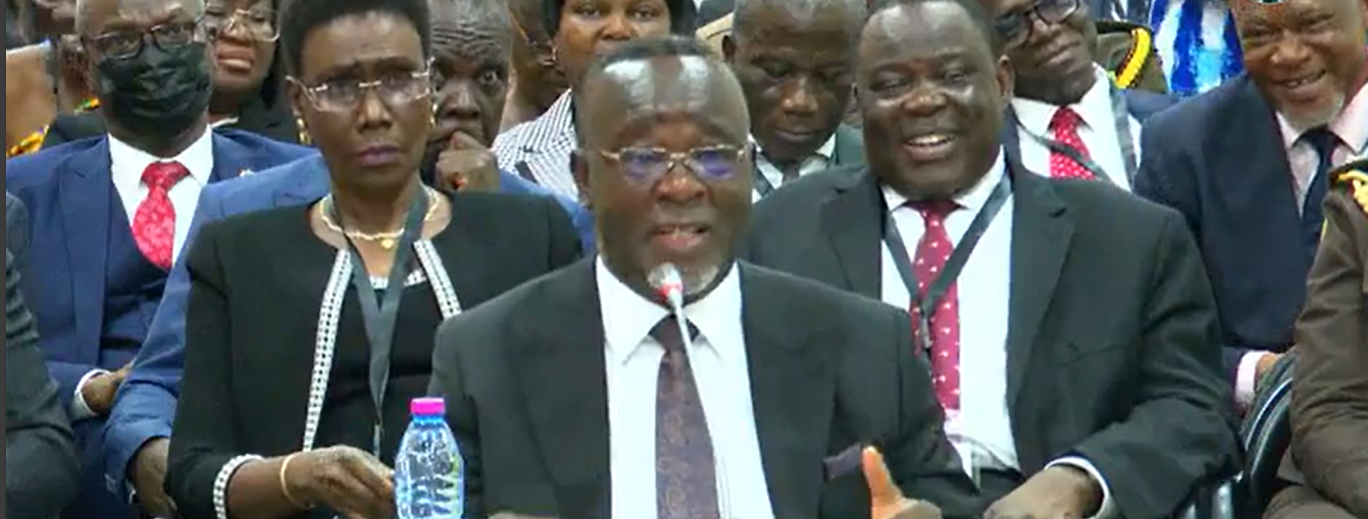adverts
Baffoe-Bonnie Vows to Reform Magistracy, Streamline Career Paths if Confirmed as Chief Justice
Acting Chief Justice Paul Baffoe-Bonnie appeared before the Parliamentary Appointments Committee to be vetted as Ghana’s Chief Justice, using the session to highlight longstanding challenges within the country’s magistracy system and proposing comprehensive reforms aimed at strengthening judicial capacity.
Justice Baffoe-Bonnie traced the origins of Ghana’s magistracy, noting that the early grade two magistrates were largely non-lawyers, including retired teachers, social welfare workers, and individuals draughted into the system without formal legal training. “The original grade two magistrates never had the opportunity to rise beyond that level because they were not trained lawyers,” he said, citing the case of Justice Avril Lavie Johnson, who had served as a grade two magistrate before her elevation.
He explained that while the grade two magistrate system was abolished in the 1990s, a new system of “career magistrates” was introduced around the millennium era. Unlike the earlier grade two magistrates, these career magistrates could be younger and undertake brief legal courses to qualify, but they were still restricted in their career progression. Even after transitioning to fully qualified lawyers, they were required to complete additional years before being recognised as professional magistrates, often delaying promotions despite extensive experience.
adverts
“Imagine someone serving as a career magistrate for seven, eight, or ten years. They transition to a lawyer but still must wait three years to become a professional magistrate. That is inefficient and discourages commitment,” Baffoe-Bonnie noted.
The Acting Chief Justice highlighted the practical consequences of this system, particularly in filling vacancies in the lower courts. He revealed that 116 district court positions remain unfilled because most newly qualified lawyers prefer joining higher courts such as the Circuit or High Court. “We will not get sufficient candidates for the district courts unless we make magistracy a viable and respected career path,” he warned.
To tackle these issues, Baffoe-Bonnie proposed several reforms, emphasising their potential to improve judicial access and efficiency:
- Reintroduction and proper structuring of career magistrates: He suggested creating a formalized framework with competitive remuneration to attract and retain talent in district and circuit courts.
- Smooth transition to professional magistracy: Magistrates who obtain law qualifications should not be required to restart waiting periods; their experience should count toward career progression.
- Recognition of experience over tenure constraints: Length of service should be factored into promotions and salary increments to ensure equity among career magistrates and newly qualified lawyers.
- Retention in underserved areas: Strengthened incentives would encourage magistrates to serve in rural and hard-to-reach locations, addressing critical staffing shortages.
Baffoe-Bonnie also highlighted the broader impact of these reforms on Ghana’s justice system. By ensuring competent, well-trained magistrates in all districts, the judiciary can maintain efficiency, reduce case backlogs, and provide consistent access to justice across the country.
“The career magistrates are crucial for taking justice to the people, especially in the rural areas,” he said. “A well-structured magistracy system will strengthen the judiciary’s reach and effectiveness, benefiting the entire nation.”
The Acting Chief Justice concluded by assuring the committee that these reforms would be a priority under the Judicial Council, emphasizing his commitment to professional development, fair career progression, and institutional strengthening.
Click the link Puretvonline.com | WhatsApp Channel to join the WhatsApp channel
GOT A STORY?
Contact/WhatsApp: +233243201960 or manuelnkansah33@gmail.com


